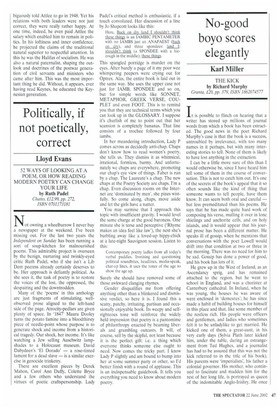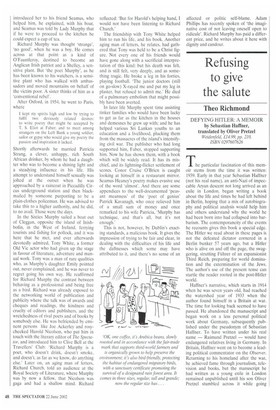No-good boyo scores elegantly
Karl Miller
THE KICK by Richard Murphy Granta, £20, pp. 379, ISBN 1862074577 It is possible to flinch on hearing that a writer has stored up millions of journal words from which a book has been extracted. The good news in the poet Richard Murphy's case is that the book is a success, untroubled by irrelevance, with too many names in it perhaps, but with many interesting stories to tell. None of them is likely to have lost anything in the extraction.
I can be a little more sure of this than I would otherwise be, since [have heard him tell some of them in the course of conversation, This is not to catch him out. It's one of the secrets of the book's appeal that it so often sounds like the kind of thing that someone wants to tell people, have them know. It can seem both oral and careful — but less premeditated than his poems. He says that he has made quite hard work of composing his verse, mulling it over in lone shielings and anchorite cells, and on holy islands, and it would appear that his journal prose has been a different matter. He speaks ill of gossip, when he mentions that conversations with the poet Lowell would drift into that condition at two or three in the morning. There was no need for him to be sad. Gossip has done a power of good, and his book has lots of it.
He grew up in the West of Ireland, as an Ascendancy sprig, and has remained attached to the region, but he went to school in England, and was a chorister at Canterbury cathedral. In Ireland, when he was young, the houses he was aware of were enclosed in 'demesnes'; he has since made a habit of building houses for himself in this place and that, like some member of the restless rich. His people were officers and gentlemen, and ladies who sometimes felt it to be unladylike to get married. He kicked one of them, a great-aunt, in his very early days (Sylvia Plath later kicked him, under the table, during an estrangement from Ted Hughes, and a journalist has had to be assured that this was not the kick referred to in the title of his book). His parents were 'imperialists', his father a colonial governor. His mother, who continued to fascinate and madden him for the rest of her long life, is portrayed as queen of the indomitable Anglo-Irishry. He once introduced her to his friend Seamus, who helped him, he explained, with his boat, and Seamus was told by Lady Murphy that if he were to proceed to the kitchen he could expect a cup of tea.
Richard Murphy was thought 'strange', 'no good', when he was a boy. He comes across at that point as a kind of O'Fauntleroy, destined to become an Anglican Irish patriot and a Shelley, a sensitive plant. But 'the poet Murphy', as he has been known to his watchers, is a sensitive plant who has walked with ambassadors and moved mountains on behalf of the victim poor. A sister thinks of him as a 'conventional rebel'.
After Oxford, in 1954, he went to Paris, where
I kept my spirits high and low by trying to fulfil two deviously related desires: to write poetry that might be accepted by T. S. Eliot at Faber; and to meet among strangers on the Left Bank a young soldier, sailor or gypsy who would give my poetry the passion and inspiration it lacked.
Shortly afterwards he married Patricia Strang, a clever, unhappy, rich South African drinker, by whom he had a daughter who was to become a shining light and a steadying influence in his life. His attempt to understand himself sexually was jolted at the outset when he was approached by a raincoat in Piccadilly Circus underground station and then blackmailed by someone purporting to be a plain-clothes policeman. He was advised to take this to a higher authority, and he did, to no avail. Those were the days.
In the Sixties Murphy sailed a boat out of Cleggan, opposite the island of Inishbofin, in the West of Ireland, ferrying tourists and fishing for pollock, and it was here that he met, and ever afterwards devotedly admired, Tony White, a former Old Vic actor who had given up the stage in favour of literature, adventure and manual work. Tony was a man of rare qualities who, as Murphy's daughter Emily pointed out, never complained, and he was never to regret going his own way. He reaffirmed for Richard Murphy the contrast between behaving as a professional and being free as a bird. Richard was already exposed to the networking world of publication and publicity where the talk was of awards and cheques and readings, the kindness and cruelty of editors and publishers, and the wretchedness of rival poets and of books by somebody else. He was befriended by eminent persons like Joe Ackerley and rosychecked Harold Nicolson, who put him in touch with the literary editor of The Spectator, and introduced him to Clive Bell at the Travellers' Club: 'Richard Murphy is a poet, who doesn't drink, doesn't smoke, and doesn't, as far as we know, do anything else.' Later on, an aging man of letters, Richard Church, told an audience at the Royal Society of Literature, where Murphy was by now a fellow, that Nicolson was gaga and had a shallow mind. Richard
reflected: 'But for Harold's helping hand, I would not have been listening to Richard Church.'
The friendship with Tony White helped him to run his life, and his book. Another aging man of letters, he relates, had gathered that Tony was held to be a Christ figure. Not every one of his friends would have gone along with a sacrificial interpretation of this kind: but his death was felt, and is still felt, very deeply, and as something tragic. He broke a leg in his forties, playing football. 'The junior doctors (still on go-slow) X-rayed me and put my leg in plaster, but refused to admit me.' He died of a pulmonary embolism that might possibly have been averted.
In later life Murphy spent time assisting tinker families who would have been lucky to get as far as the kitchen in the houses and demesnes he grew up with; and he has helped various Sri Lankan youths to an education and a livelihood, plucking them from the massacres of the island's intensifying civil war. The publisher who had long supported him, Faber, stopped supporting him. Now he has shown them, with a book which will be widely read. It has its mischief, and its lightning-flicker settlement of scores. Conor Cruise O'Brien is caught looking at himself in a restaurant mirror. Seamus Heaney's poetry makes evasive use of the word 'almost'. And there are some appendices to the well-documented 'peasant meanness' of the 'poet of genius' Patrick Kavanagh, who once relieved him of a small sum of money and once remarked to his wife Patricia, 'Murphy has technique, and that's all, but it's not enough.'
This is not, however, by Dublin's exacting standards, a malicious book. It gives the impression of trying to be fair and clear, in dealing with the difficulties of his life and the daftnesses which some may have attributed to it, and there's no sense of an `OK one coffee, it's Arabica beans, slowly roasted and in accordance with the fair-trade mark that supports third-world farmers and is organically grown to help preserve the environment; it's also bird-friendly, protecting the habitat of endangered migratory birds, with a sanctuary certificate promoting the survival of a designated rain forest area. It comes in three sizes, regular, tall and grande; now the regular size has . . . affected or politic self-blame. Adam Phillips has recently spoken of 'the imaginative cost of not leaving oneself open to ridicule'. Richard Murphy has paid a different price, and he writes about it here with dignity and candour.











































































 Previous page
Previous page